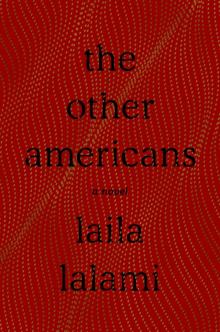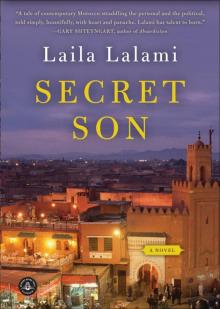- Home
- Laila Lalami
Hope & Other Dangerous Pursuits Page 9
Hope & Other Dangerous Pursuits Read online
Page 9
Halima closed the door and heaved a sigh. “Now she’s going to want more,” she said. “And she’s going to tell others.”
Farid was already peeling the blue paper off the cone of sugar. He broke off three pieces and gave one each to his brother and sister before putting one in his mouth. He grinned. “You said it didn’t hurt.”
A WEEK LATER, Halima was mixing the dough for beghrir when she heard a knock. Mouna opened the door. Halima’s mother, Fatiha, shuffled in, leaning on her cane.
“What are you doing here?” Halima asked, getting up.
“Can’t I see my own grandchildren?” Fatiha answered, an indignant look in her eyes. “You never bring them around anymore, so your poor mother has to take the bus all the way here to see them.” She took off her jellaba and sat down on the mat.
Halima was afraid of what the unexpected visit might mean. Would her mother try to convince her once again to go back to Maati? Would she ask her to stop selling food at the market and get a proper job? Whatever it was, Halima knew the visit could not mean good tidings. “Go play outside,” she told the children.
“Wait,” Fatiha said. She rummaged for something in her purse, pulled out a handful of sweets. “I brought some candy for them.” Amin and Mouna rushed to get their shares, noisily unwrapping the sweets, comparing colors and flavors.
“Have some, Farid,” Fatiha said, stretching her crooked hand open for her grandson.
The boy shook his head. “I don’t feel like having candy.”
“Well, at least come closer, let me look at you,” she pleaded.
“I’m just going to play outside.” He grabbed the deflated football and took off, trailed by his siblings.
Fatiha clicked her tongue. “Bad manners,” she said.
“Can you never say anything positive?” Halima asked. It was just like her mother, she thought, to find fault with three sweet children like Mouna, Farid, and Amin. Fatiha pursed her lips and stayed quiet for a while, watching as Halima poured some batter onto the stone griddle.
“Have you been to the doctor?” Halima asked.
“What for?”
“For your arthritis.”
Fatiha grumbled something about having already gone to enough doctors.
“You should go again. These days, they probably have better medication.”
“I don’t need medication. I’ll be fine,” Fatiha said, her voice trembling. “Besides, why should I worry about myself when my own daughter doesn’t care enough about me to let me have a little blessing?”
Halima shook her head. Her mother’s knack for melodrama was something she’d never get used to. She could never get used to people who wanted others to help them out of their problems instead of relying on themselves. She picked up the first beghrir and set it on the tray, then ladled more dough.
“We all care about you, Mmi,” Halima said. “Here, have a taste.”
Fatiha rolled up the beghrir and took a bite. “God, this is delicious.”
“I’ll take you to the doctor myself.”
“I don’t have the money to go to the doctor’s.”
“Don’t worry. I’ll pay,” said Halima. She reached out and touched her mother’s arm as if to comfort her. Then she turned to watch the beghrir break into bubbles as it cooked. She did not notice the fading afternoon light that lengthened the shadows behind her, framing her body like the arches of a shrine.
The Odalisque
THE TEENAGER WAS Faten’s favorite client. He wasn’t what you would call a regular, like her Friday-night or first-of-the-month men, those who came to her the way they might stop by a bakery and buy an extra pastry to go with their coffee because they’d just gotten paid. In the five months that she’d known him, there hadn’t been a regular pattern to his visits, but whenever she saw his car coming up Calle Lucia, she’d arch her back, cock her hip, and smile. He always got out of the car, too, which is more than you could say for the others, the men who talked to her while they bent over their steering wheels, as if spending more than a minute deciding who they were going to fuck was too much of an imposition on their time. He was different.
His name was Martín. At first she’d assumed it was just a fake name, but someone had called his mobile phone once, right after he’d paid her, and she’d heard a hoarse voice at the other end of the line yelling the name. It sounded like a cop—someone with authority, someone used to giving orders. Later on, she asked Martín who it was and he said it was his father, calling from Barcelona to ask why he was out so late, as if Martín were still a child. Martín explained that he was the youngest of his father’s children from two marriages. He shook his head and put his phone away, grumbling that el viejo was losing it.
She did not know Martín’s last name. What she did know was that he had recently moved to Madrid to attend Universidad Complutense. He never talked about what he studied, and she didn’t ask, for she feared it would bring back memories of her own college life back in Morocco and she didn’t want to think of that time in her life, when the world still seemed full of promise and possibility.
In a way, Faten liked never knowing when he’d stop by. It gave her something to look forward to, and if he showed up, it was like a gift, something she could unwrap and hold up to admire. The later it got, the better the surprise. And there was, too, the possibility that if he came up to see her late in the night he could be her last one, so it didn’t matter how long she stayed with him. That kept her going on bad nights, when it rained or when the girls bickered. The Spanish girls often fought with the Moroccans or Romanians or Ukrainians, but it was a useless battle. Every week there was a new immigrant girl on the block.
Martín reminded her of a neighbor she’d had a crush on when she was little. At that time she had been sent to live in Agadir with her aunt because her mother couldn’t afford to keep her in Rabat, what with her father having left them and the child support the court had ordered him to pay never having materialized. Faten had stayed in the seaside town until she turned fourteen and her breasts grew into a D cup. The single man next door had started coming around on the silliest of excuses, asking to borrow a cup of sugar or a glass of oil. That was when Faten’s aunt decided it was time for her to go back to the capital.
Faten had moved in with her mother in the Douar Lhajja slum, the kind of place where couscous pots were used as satellite dishes. She’d stayed there for six years—and in that short time she had managed to graduate high school, go to college, find God, and join the Islamic Student Organization. She’d had the misfortune of making a derogatory comment about King Hassan within earshot of a snitch but had, rather miraculously, escaped arrest, thanks to a friendly tip. So when her imam suggested she leave the country, she had not argued with him. She had done as she was told. Except her imam wasn’t there when the Spanish coast guard caught her and the other illegal immigrants, nor was he around when she had to fend for herself in Spain. Now no one could decide for her whether or not she could see Martín.
Tonight had been good. She’d made good money and Martín was her last client. She climbed into his car and pulled down the passenger-side mirror, dabbing her face dry with a Kleenex and reapplying her lipstick. She glanced at him. His light brown hair was falling out prematurely, and his thin lips grew thinner whenever he was emotional. He wore a pair of dark slacks and a loose button-down shirt, where gold arabesque letters danced on a sea of deep red. She asked what he wanted to do.
“Just talk,” he said. “Can we?”
“Como que no,” she said.
He started the car and drove slowly off Calle Lucia, toward Huertas. Faten let her head rest against the seat and stretched her legs, her feet painful from standing too long in high heels. It had been just as hard to get used to the heels as to the short skirts. Before this, back at home, it was always flats or sneakers, an ankle-length skirt, and a secondhand sweater.
“So, where are you from?” he asked.
“Rabat.”
“I thought yo
u were from Casablanca.”
“I can be from Casablanca if you want.” She laughed, wanting him to know it was just a line, not something she’d actually tell him with seriousness. She wanted him to know that she thought he was different.
He turned up a side street and stopped the car. She was quiet, watching the lights from the bars up the street, trying to figure out where they were with respect to Lavapiés, where she lived. She spent a lot of time on the street, yet she didn’t know Madrid well at all. Since she’d arrived here, she hadn’t seen much—only the streets, her apartment, the hospital, and the stores.
Martín spoke softly. “How long have you been in Madrid?”
“Three years, just about.”
“I bet you have a lot of regulars.”
“A few. Not a lot.”
“They don’t know what they’re missing.”
“And what would that be?”
He circled the knob of her knee with his thumb. “So much,” he said. “I like the smell of your skin—salty like black olives.” He coiled a strand of her hair around his finger, let it spring out, ran his fingers along her cheekbones, cupped her right breast. “And your breasts—ripe like mangoes.”
“You’re making me sound like a dish,” she said.
“I guess you could say I’m a connoisseur.”
She looked into his eyes, and for the first time she wondered if what she had assumed was a flicker of innocence was something else—a twinkle of playfulness, even mischief. “There’s something I’ve been meaning to ask,” she said. “About your father. Is he a cop?”
“He’s a pig.”
“Why do you call him that?”
“Because he’s a fascist,” he said. He leaned back against the headrest as he spoke, telling her about his father, a retired army lieutenant who had served under Franco as a young man. It was a bit of a tradition in the family, Martín’s grandfather having served under Franco as well. Hearing the Generalissimo’s name stirred in Faten memories about her maternal grandfather, a proud Rifi who’d lost his eyesight during the rebellion in the north. It was mustard gas, he’d told his children, and he’d spent the rest of his life begging for a gun to put an end to it all. It was cancer that took him away, though, two years before Faten was born.
Martín said his father hated the immigrants. He shook his head. “But I’m not like him,” he said. “I like you.”
“You do,” she said, in her I’ve-heard-it-all-before voice.
Martín didn’t seem to mind the sarcasm. “I want to help you,” he said, stroking her arm. He said he could help her get her immigration papers, that he knew of loopholes in the law, that she could be legal, that she wouldn’t need to be on the streets, that she could get a real job, start a new life.
Faten had never expected anyone to make extravagant promises like these, and so she wasn’t sure whether she should laugh or say thank you. For a moment she allowed herself to imagine what a normal life would be like here, never having to see the men, being able to sleep at night, being able to look around her without worrying about the police at every turn. She began to wonder about the price of all this—after all, she had long ago learned that nothing was free. He laughed when he noticed her fixed gaze. “But first, tell me about yourself. Where did you live in Rabat?”
She shrugged. “An apartment.”
“With your parents?” he asked.
“My mother.”
“Any brothers or sisters?”
“No.”
“That’s unusual, isn’t it?” he asked. “I mean, being an only child, in your country.”
“I guess.”
“And did you wear those embroidered dresses? What are they called? Caftans?”
“Not really.”
He seemed disappointed and, looking down at the steering wheel, he bit his fingernails, tearing strands of cuticle with his teeth.
“What’s with all the questions?” she asked. “Are you doing a term paper about me?” she joked.
He threw his head back and laughed. “Of course not,” he said, slipping his hand down her thigh. She burrowed through her purse, looking for condoms, and discovered she was out. When she told him this, he said he had extras in the glove box. She opened it and, there, between CDs, maps, and gas-station receipts was a copy of the Qur’an.
“What’s this?” Faten said, sitting straight up, holding the book in her hand.
“Don’t touch that,” he said, putting it back.
“Why? Is it yours?”
“Yes, it’s mine.”
She blinked. The brusque tone was not something she was used to from him. “Why do you have it in your glove box?” she asked.
“I’m just reading up,” he said. He reached out and caressed her hair. “Can we get on with it?”
She nodded her head and passed him the condom. In her experience with men, she’d long concluded that even when they said they only wanted to talk, they always wound up wanting some action, too. Maybe Martín was no different after all.
When it was over she adjusted her miniskirt and buttoned her corduroy jacket. Martín’s questions and his offer of help had caught her unprepared; his wanting to have sex had disappointed her. She felt the same sadness that she had felt as a child, when she’d discovered that the silkworm she’d raised in a shoe box and lovingly fed mulberry leaves had died, despite all her care. She’d cried all day, wondering what she could have done differently to keep the worm alive, until her aunt came home and told her that that was what happened sometimes with silk worms—they died no matter how carefully you took care of them.
He started the engine. “I’ll drop you off if you want.”
She opened the door and got out. “I’ll just take a taxi.”
FATEN CLIMBED THE STAIRS to her apartment just as the garbage trucks were making their rounds. She heard one of the men hollering at another in Moroccan Arabic, telling him, as he emptied a bin, that the family at 565 had just had a baby. Cleaning out people’s trash, the men got to know everything about everyone’s lives. Sometimes Faten felt that way about herself, as though she had been entrusted with people’s secrets and her job was to dispose of them.
Faten found her roommate, Betoul, in the kitchen eating breakfast. Betoul worked as a nanny for a Spanish couple in Gran Vía, and she had to take an early bus in order to get there before 6:30, when the lady of the house required her help. Sometimes Betoul couldn’t resist talking about her bosses, how the wife was given to depression, how the husband liked to read his newspaper in the bathroom, leaving urine stains on the floor. But Faten didn’t like to hear about the husband at all. She heard enough from the men in her job.
Betoul was from Marrakesh, where she had two younger sisters in university, one brother who worked as a photographer, and another who was still in high school. She was one of those immigrants with the installment plan—she sent regular checks in the mail to help her brothers and sisters. In addition, she lived like a pauper for eleven months of the year, and then, in August, she flew home and spent whatever was left in her bank account. Of course, her yearly trips only made people back home think that she made a lot of money, and so she always came back with long lists of requests in her hand and new worry lines etched on her forehead.
In Morocco Betoul would never have lived with Faten, but here things were different. Here Betoul couldn’t put on any airs, the way she would have at home. She had moved in with Faten because the rent was cheaper than anything else she could find, allowing her to save even more money to send home.
Faten dropped her bag and keys on the counter. “Good morning.”
“Morning,” Betoul said. “You left the door unlocked last night.”
“I did? I’m sorry.”
“You should be more careful. Someone could have gotten in here.”
“I’m sorry,” Faten said. “I’ve been distracted lately.”
Betoul nodded and finished her slice of buttered bread. She drank the rest of her coffee standing. Th
en she put a few grains of heb rshad in a hermetically sealed plastic bag, which she stuffed in her purse.
“What’s that for?” asked Faten.
“For Ana,” Betoul said. Ana was the toddler, the youngest of the three children whom Betoul watched while their parents worked. “She’s had a bit of a cold, and so I thought of making her some hlib bheb rshad.”
“Why do you bother?” Faten asked.
Betoul zipped her purse closed.
“I’m sure Ana’s mother wouldn’t want you giving that to her anyway,” Faten said.
“What would you know of what she wants?”
“She’ll probably laugh at you and throw it out.”
“You’re the one that people laugh at—the way you sell your body.”
Faten felt her anger take over her fatigue. She had been wary of having Betoul as a roommate. She’d heard a rumor that back home, when Betoul had found out that her husband, a truck driver, had been cheating on her with a seamstress from Meknès, she’d put a sleeping pill in his soup and then drawn X’s on his cheeks with henna while he slept, leaving him marked for days. Faten had finally agreed to room with Betoul because she wanted someone with a day job, someone whom she wouldn’t see much.
“I’m not forcing you to stay here,” Faten said. “You can move if you want.”
Betoul left, slamming the door behind her.
ORDINARILY, AFTER FATEN came home she took a shower, slept until two, and then took a sandwich to the park and watched old couples feeding the pigeons or young ones kissing on the benches. If the weather was too cold, she watched television or went shopping. But today her routine was already off. She couldn’t sleep. She stared at the ceiling for a while and then turned to look at her nightstand, where a pocket-size edition of the Qur’an lay, a thin film of dust over it. She remembered her college days, when she’d decided to wear the hijab and preached to every woman she met that she should do the same. How foolish she had been.

 The Other Americans
The Other Americans The Moor's Account
The Moor's Account Hope & Other Dangerous Pursuits
Hope & Other Dangerous Pursuits Secret Son
Secret Son